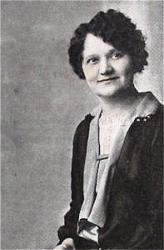Planning worship?
Check out our sister site, ZeteoSearch.org,
for 20+ additional resources related to your search.
- |
User Links
Person Results
Anna Hoppe

1889 - 1941 Person Name: Anna Hoppe Translator of "My Savior sinners doth receive" Anna Hoppe was born on May 7, 1889 in Milwaukee, Wisconsin. She left school after the eighth grade and worked as a stenographer. She began writing patriotic verses when she was very young and by the age of 25 she was writing spiritual poetry. After some of her poems appeared in the Northwestern Lutheran, a periodical of the Wisconsin Evangelical Lutheran Synod, they came to the attention of Dr. Adolf Hult of Augustana Seminary, Rock Island, Illinois. He influenced her to write her Songs for the Church Year (1928). Several hymnals include her work, which was usually set to traditional chorale melodies, although she also made a number of translations. She died on August 2, 1941 in Milwaukee, Wisconsin.
NN, from Cyber Hymnal
Anna Hoppe
Leopold Franz Friedrich Lehr
1709 - 1744 Person Name: Leopold F. Lehr Author of "My Savior Sinners Doth Receive" in The Lutheran Hymnal Lehr, Leopold Franz Friedrich, son of Johann Jakob Lehr, Hofrath at Cronenburg (Cronberg, Kronberg), near Frankfurt-am-Main, was born at Cronenburg, Sept. 3, 1709, and entered the University of Jena in 1729, In 1730 he went to Halle to study under J. J. Rambach and G. A. Francke; and here he also acted as tutor to the children of J. A. Freylinghausen, and conducted devotional meetings at the Orphanage. In July 1731 he became a tutor at Cöthen (Köthen) to the princesses of Anhalt-Cöthen, and held this post till 1740, when he was appointed diaconus of the Lutheran church at Cöthen. While on a visit to his father-in-law at Magdeburg he was seized with fever, and died there, Jan. 26, 1744. (Koch, vi. 446, &c.)
Lehr's hymns are full of love to Christ and of the wonders of the redeeming grace of God. They are allied to those of Allendorf (q.v.), and were also mostly contributed to the Cöthnische Lieder (p. 50, ii.). of which he was joint editor. In 1757 they were edited along with his other poetical works as his Himlisches Vergnügen in Gott und Christo, Halle, 1757. [Wernigerode Library] by Samuel Helmich, then court preacher at Glückstadt, Holstein, who had married Lehr's widow.
Those which have passed into English are:—
i. Mein Heiland nimmt die Sünder an. Lent, or The Friend of Sinners. Written in 1731 or 1732 as a companion to the hymn "Jesus nimmt die Sünder an" [see Neumeister]. First published in the Einige geistreiche Lieder, Cöthen, 1733, No. 9, in 11 stanzas of 10 lines, entitled "Luke xv. 2. This Jesus receiveth sinners and eateth with them." Included in J. J. Rambach's Haus Gesang-Buch 1735, No. 264, the Berlin Geistlicher Lieder Schatz, ed. 1863, No. 114, &c. The translations are:—
(1) "My Saviour sinners doth receive, Whom with sin's." This is No. 217 in the Moravian Hymn Book, 1789. In the ed. of 1886, No. 258 begins with st. viii., "Come, all that heavy laden are." (2.) "My Saviour sinners doth receive, Whom under burden," by Dr. John Ker in the United Presbyterian Juvenile Missionary Magazine, May, 1858.
ii. So hab' ich nun den Pels erreichet. The Rock of Ages. 1733 as above, No. 4, in 6 stanzas of 10 lines, entitled " Is. xxvi. 4. The Lord is a rock for ever " (so Luther's version). In Rambach's Haus Gesang-Buch, 1735, No. 303, and the Berlin Geistlicher Lieder Schatz. ed. 1863. The translations are:—
(1) "I now have found the Rock of Ages," by Dr. H. Mills, 1845 (1856, p. 84). (2) "I have at last attained the Rock," by Mitt Warner, 1869, p. 34.
iii. Was hinket ihr, betrogne Seelen. Confirmation. An exhortation to true and whole-hearted earnestness, founded on 1 Kings xviii. 21. 1733 as above, No. 1, in 12 stanzas of 6 lines, and the refrain "Hindurch." In J. J. Rambach's Haus Gesang-Buch, 1735, No. 338, and the Unverfälschter Liedersegen 1851, No. 345. Translated as:—
“Why haltest thus, deluded heart," by Miss Winkworth, 1855, p. 142 (1856, p. 143, beginning "Why halt thus, O deluded heart"). [Rev. James Mearns, M.A.]
--John Julian, Dictionary of Hymnology (1907)
Leopold Franz Friedrich Lehr


 My Starred Hymns
My Starred Hymns


